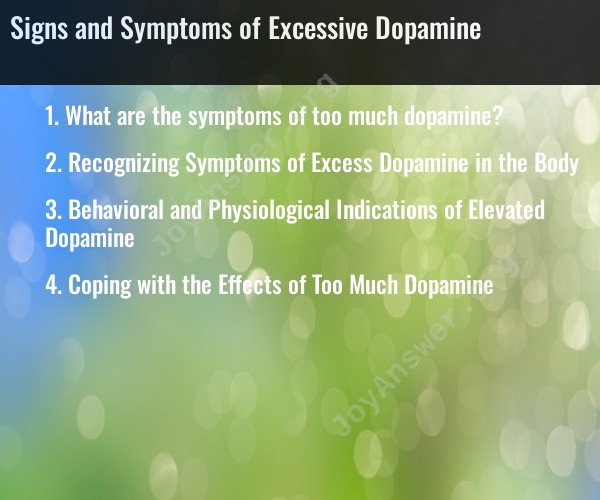What are the symptoms of too much dopamine?
Excess dopamine, a neurotransmitter in the brain, can lead to a condition known as dopamine excess or dopamine dysregulation. However, it's important to note that this condition is relatively rare and can be caused by various factors, including drug use, certain medical conditions, or medication side effects. Excessive dopamine levels can result in various physical and psychological symptoms, including:
Psychosis: Excess dopamine can lead to symptoms of psychosis, such as hallucinations (seeing or hearing things that aren't there) and delusions (holding false beliefs despite evidence to the contrary).
Mania: Elevated dopamine levels can contribute to manic episodes, characterized by increased energy, impulsivity, decreased need for sleep, and heightened mood. These are often seen in conditions like bipolar disorder.
Restlessness and Hyperactivity: Individuals with excess dopamine may experience restlessness, hyperactivity, and an inability to sit still.
Agitation: An increase in dopamine can lead to increased levels of agitation and irritability.
Anxiety: Some people may experience heightened anxiety or anxiety disorders with excess dopamine.
Paranoia: Elevated dopamine levels can contribute to feelings of paranoia and suspiciousness.
Addictive Behaviors: Excess dopamine is associated with increased risk of addiction or impulsive behaviors as it can contribute to reward-seeking behaviors.
Compulsive Behaviors: It may lead to compulsive behaviors, such as repetitive actions or obsessions.
Insomnia: Difficulty falling or staying asleep may occur due to heightened arousal from excess dopamine.
Tics and Movement Disorders: In some cases, excess dopamine can result in tics, tremors, or other movement disorders.
Elevated Heart Rate and Blood Pressure: Increased levels of dopamine can contribute to higher heart rate and blood pressure.
It's important to recognize that these symptoms can be indicative of various conditions and are not specific to excess dopamine alone. Excess dopamine can be related to specific medical conditions or substance abuse, so a thorough evaluation by a healthcare professional is necessary to determine the underlying cause and appropriate treatment.
Treatment for excess dopamine will depend on the underlying cause, and it may include medication adjustments, behavioral therapy, lifestyle changes, or addressing the specific condition responsible for the dopamine dysregulation. If you or someone you know is experiencing symptoms like those mentioned above, it's important to seek medical or psychiatric evaluation and guidance.
Recognizing Symptoms of Excess Dopamine in the Body
Dopamine is a neurotransmitter that plays a role in many important bodily functions, including movement, mood, motivation, and reward. However, too much dopamine can lead to a number of health problems.
Here are some of the symptoms of excess dopamine in the body:
Behavioral symptoms:
- Increased energy and activity
- Talkativeness
- Agitation and restlessness
- Irritability and anger
- Risk-taking behavior
- Compulsive behavior
- Psychosis
Physiological symptoms:
- Rapid heart rate
- High blood pressure
- Sweating
- Tremors
- Headache
- Nausea and vomiting
Behavioral and Physiological Indications of Elevated Dopamine
Excess dopamine can lead to a number of behavioral and physiological changes.
Behavioral changes:
- People with excess dopamine may become more active and talkative.
- They may also become more agitated, restless, irritable, and angry.
- They may be more likely to engage in risk-taking and compulsive behavior.
- In severe cases, people with excess dopamine may develop psychosis.
Physiological changes:
- People with excess dopamine may experience an increased heart rate, high blood pressure, sweating, tremors, headache, and nausea and vomiting.
Coping with the Effects of Too Much Dopamine
If you are experiencing symptoms of excess dopamine, there are a number of things you can do to cope:
- Get regular exercise. Exercise can help to reduce dopamine levels in the brain.
- Eat a healthy diet. A healthy diet can help to improve overall mood and well-being.
- Get enough sleep. Sleep is essential for good mental health.
- Avoid caffeine and alcohol. Caffeine and alcohol can increase dopamine levels in the brain.
- Learn relaxation techniques. Relaxation techniques such as deep breathing and meditation can help to reduce stress and anxiety.
- Seek professional help. If you are struggling to cope with the effects of excess dopamine, you should seek professional help from a therapist or counselor.
In some cases, medication may be necessary to treat excess dopamine. However, medication should only be used under the supervision of a medical professional.
It is important to remember that you are not alone. There are people who can help you cope with the effects of excess dopamine. If you are struggling, please reach out for help.












